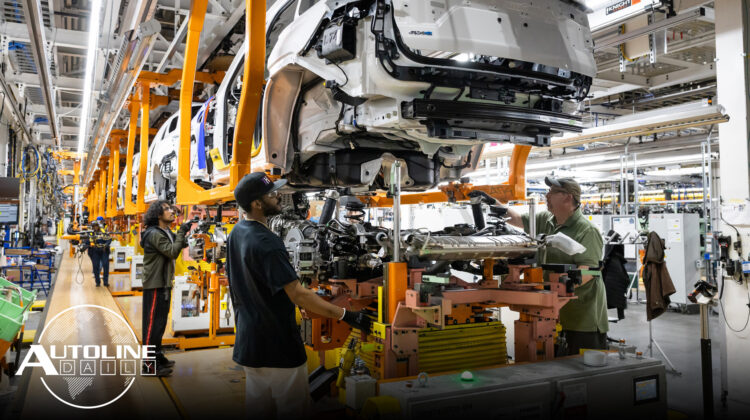
Listen to “AD #3633 – Stellantis Could Be UAW Strike Target; VinFast Adds $55 Billion In Market Cap; GM Ultimum Plant Has Chemical Spill” on Spreaker.
Follow us on social media:
Runtime: 8:41
0:00 Stellantis Could Be UAW Strike Target
1:10 China Adds Another EV Manufacturer
2:19 Stellantis Explores JV With Leapmotor
2:59 1 Million+ China-Made EVs Headed to EU
3:53 GM Ultium Plant Has Chemical Spill
4:43 Right-To-Repair Victory in Massachusetts
5:29 Tesla Lowers Production in Berlin
6:25 VinFast Adds $55 Billion In Market Cap
Visit our sponsors to thank them for their support of Autoline Daily: Bridgestone, Intrepid Control Systems, Schaeffler and Teijin.
This is Autoline Daily, the show dedicated to enthusiasts of the global automotive industry. Sean was called to jury duty, so I’m filling in today.
STELLANTIS COULD BE UAW STRIKE TARGET
We are now 22 days away from a potential UAW strike, and while the union has not declared which automaker may be its strike target, Stellantis is increasingly in the UAW’s crosshairs. There are several reasons. First, Stellantis is bigger and more profitable than GM or Ford, so it’s easier to say the company can afford a richer contract. Second, Stellantis is not an American company, making it an easier target politically for the union. And third, UAW President Shawn Fain worked at Chrysler, which became DaimlerChrysler, which was bought by Cerberus, which became FiatChrysler, which then merged with Peugeot to become Stellantis. Shawn Fain doesn’t seem to like the company or its CEO Carlos Tavares. Now, none of this means that Stellantis will be the strike target, but it’s sure starting to look that way.
CHINA ADDS ANOTHER EV MANUFACTURER
No one seems to know for sure how many electric car companies there are in China. It could be 200. It could be 300. But whatever the number is, now there’s one more. Xiaomi, which is one of China’s largest smartphone manufacturers, just got permission from the government to start building electric cars. It wants to make 100,000 next year and then double it after that. But it will be entering the market at a time when there’s a glut of EVs and a price war that shows no signs of slowing down. Reuters reports that capacity utilization is only 54%. Many automotive experts believe there will ultimately be a big shakeout in the Chinese auto industry. But it could be a long time before that ever happens. In China, automotive manufacturing is considered a key way to generate hundreds of thousands of jobs. Many Chinese car companies are state-backed enterprises, and the state will continue to prop them up to protect those jobs no matter what.
STELLANTIS EXPLORES JV WITH LEAPMOTOR
And right on cue, Stellantis is trying to get back into the Chinese market. It’s exploring a potential tie-up with Leapmotor, which makes electric cars. Last year Stellantis folded its joint venture with Guangzhou, after Stellantis tried to take majority control over Guangzhou’s objections. At the time, Stellantis said it would serve the Chinese market by exporting cars there. But by trying to join forces with Leapmotor, it sure looks like it changed its mind. Interestingly, Volkswagen is also exploring a partnership with Leapmotor, which means we need to start paying more attention to this company.
1 MILLION+ CHINA-MADE EVs HEADED TO EU
ABI Research says that in 2030, Chinese automakers will be exporting 1.2 million BEVs to the European Union. Last year, 28% of all BEVs sold in the EU were made in China. But that also includes China-made EVs imported by BMW, Tesla, Renault and other European brands. Europe is an attractive target for Chinese exports because it’s a rich market with relatively little protectionist measures, which is why several European car execs are calling for higher tariffs.
GM ULTIUM PLANT HAS CHEMICAL SPILL
General Motors is struggling to ramp up EV battery production at its Ultium plant in Ohio. And now it’s dealing with a chemical spill that disrupted production. The Detroit News reports that over the weekend a slurry containing battery materials and a hazardous solvent leaked on the ground near equipment in a mixing area. No employees were injured or exposed to the spill. The company halted mixing operations and it will remain paused until the area is deemed safe. The spill was reported to the Occupational Safety and Health Administration and it’s now investigating the incident. And this gives more ammo to the UAW, which has criticized the working conditions of the plant, which it calls “hazardous.”
RIGHT-TO-REPAIR VICTORY IN MASSACHUSETTS
Good news on the right-to-repair front for independent repair shops in Massachusetts. The National Highway Traffic Safety Administration or NHTSA no longer opposes a Massachusetts law requiring automakers to provide vehicle data to independent repair shops. NHTSA was against the law because it said allowing independent shops access to that data would make vehicles more vulnerable to hacking. But now NHTSA reversed its objection and says diagnostic data can be shared with independent shops, as long as they use short-range wireless technology. The Agency says long-range wireless technology still poses a hacking risk.
TESLA LOWERS PRODUCTION IN BERLIN
Tesla was making progress ramping up production at its German plant earlier this year but now output is slowing at the plant. In February, it hit 4,000 vehicles per week and boosted that to 5,000 per week in March. But now Business Insider reports Tesla lowered its production target to 4,350 per week in July and August, according to internal documents and anonymous sources. And they say Tesla plans to lower the target again to less than 4,000 per week. The plant was tooled for about 500,000 vehicles a year, which is about 10,000 per week. And in July, Tesla announced it wants to boost that to 1 million vehicles annually. According to the website, EU-EVs, Tesla sales in Europe were up 171% in the first half of the year compared to the year before.
VINFAST ADDS $55 BILLION IN MARKET CAP
What the heck is going on with the stock price of VinFast? On Monday we reported the price fell in half, wiping out $30 billion in market capitalization. Yesterday, shares shot up 127%, adding $55 billion in market cap. One key reason for all the volatility is that very few shares are available for trading. That’s because 99% of all shares are owned by the founder of the company, billionaire Pham Nhat Vuong. The shares have been going up or down by 14% almost every day which is attracting the attention of a lot of day traders, which means it’s probably in store for a lot more wild swings.
And that brings us to the end of today’s report, thanks for watching.
Thanks to our partner for embedding Autoline Daily on its website: WardsAuto.com
Seamus and Sean McElroy cover the latest news in the automotive industry for Autoline Daily.





